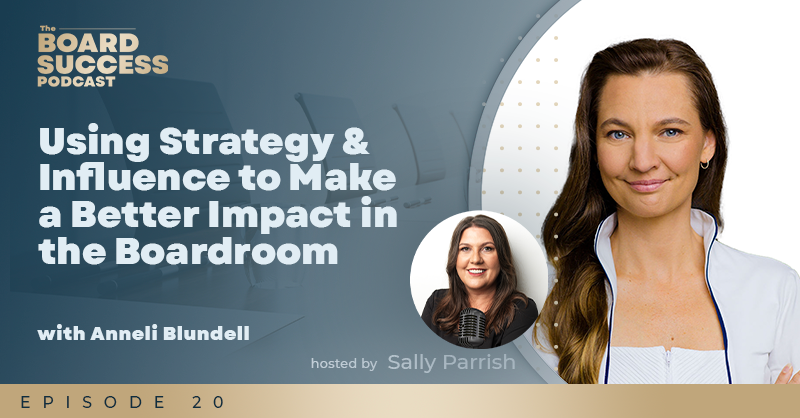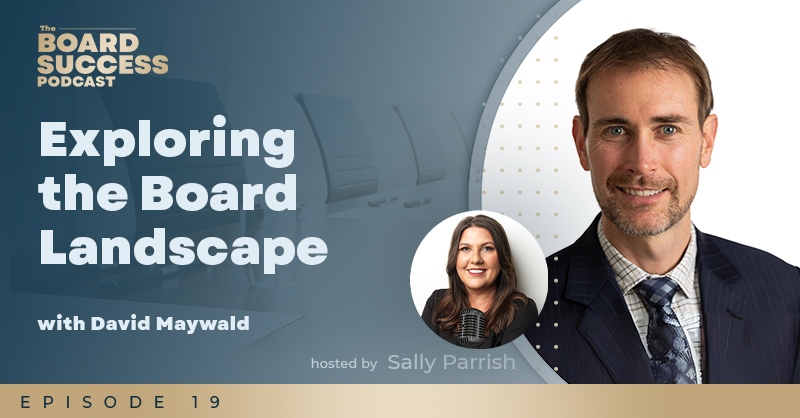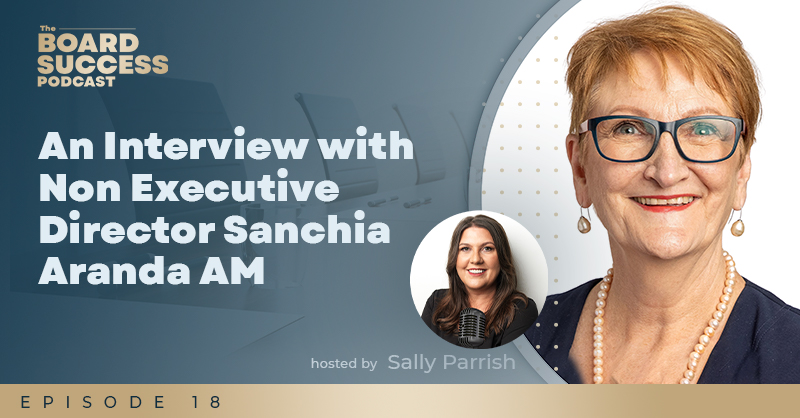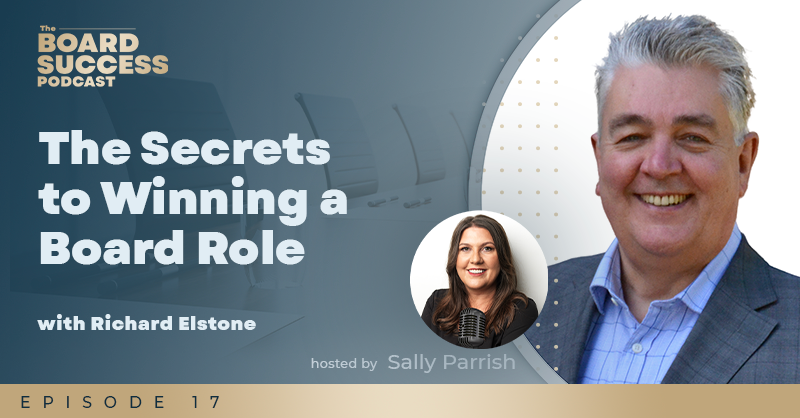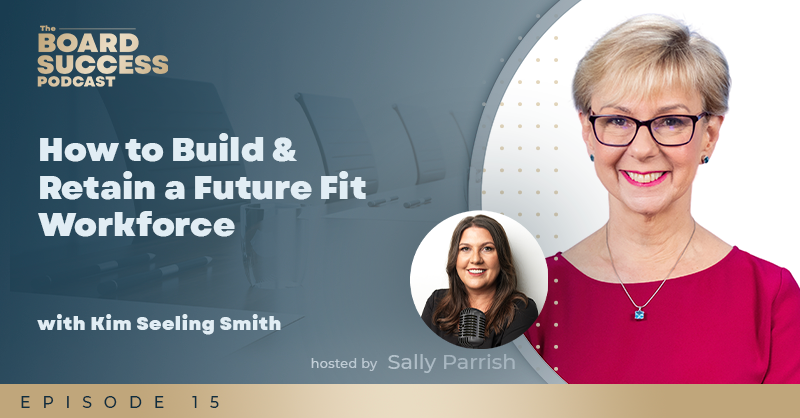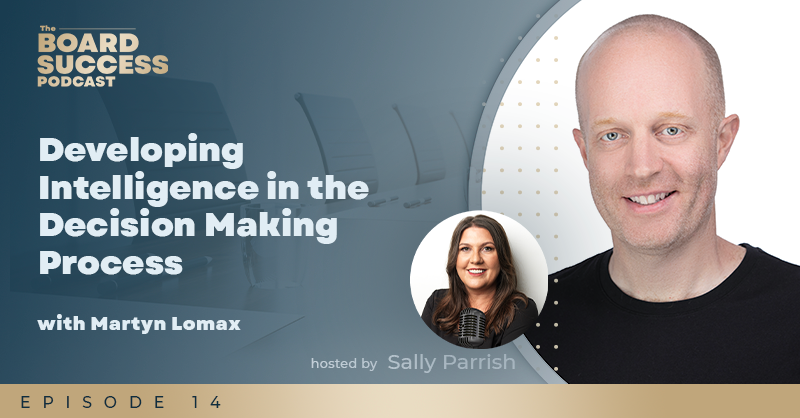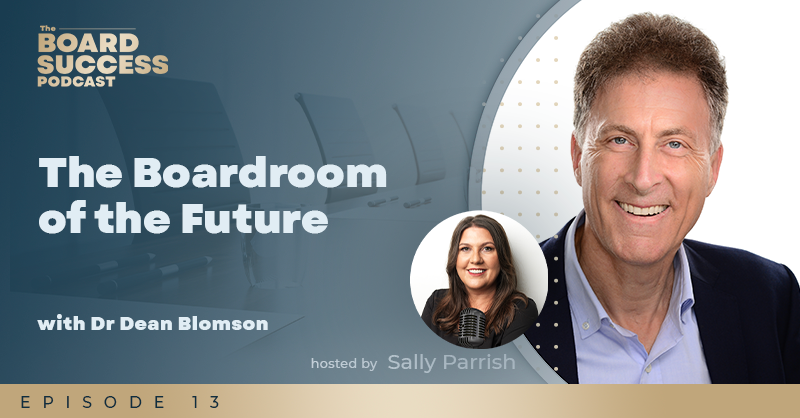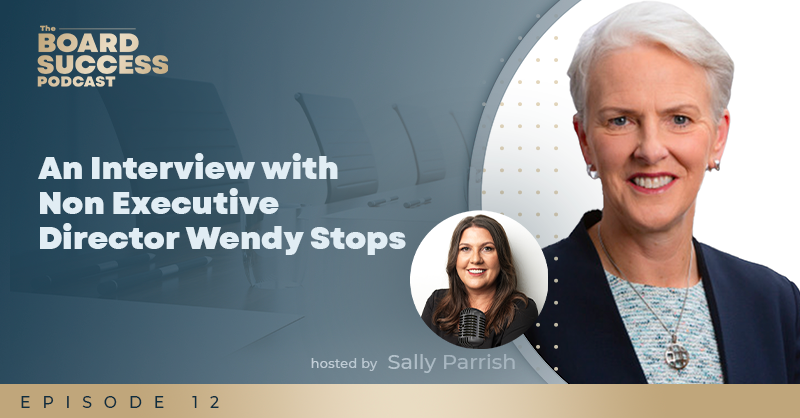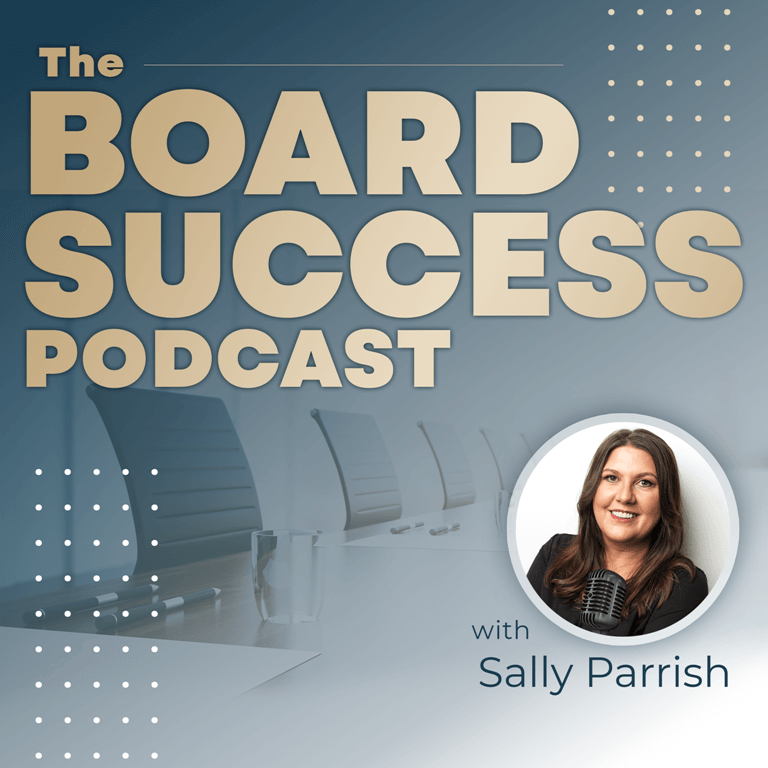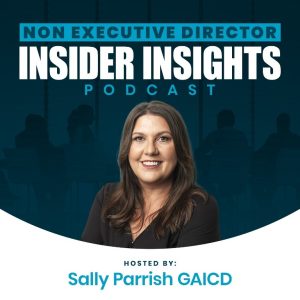An Interview with Wayne Harrison
Sally Parrish interviews Negotiations Expert Wayne Harrison
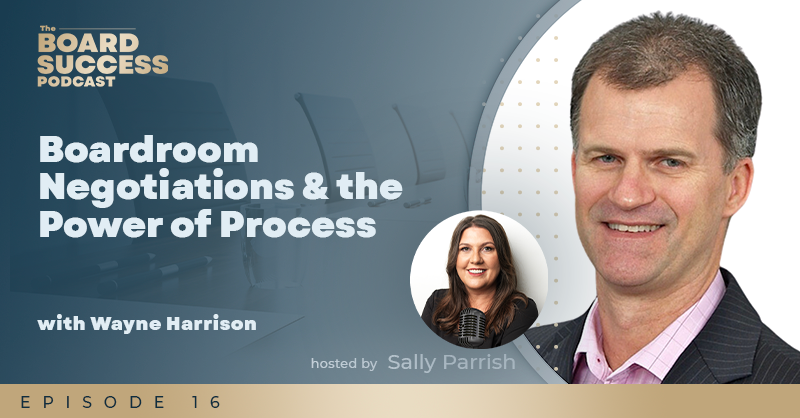
Negotiating in the boardroom is an art that requires finesse, strategy, and a deep understanding of the dynamics at play. It is often where the fate of companies can be determined, and the stakes are high. In this episode, negotiations expert and author of "From Hope To Strategy -The Anatomy of Negotiation.”, Wayne Harrison joins us to share his insights on negotiations and the power of process .
Wayne is the Founder of Pathfinders Downunder and is a respected authority on negotiation and communication. With extensive experience as a researcher, practitioner, and strategist, he is sought after by organisations to enhance collaboration, problem-solving, and negotiation capabilities.
Boardroom negotiations can be pivotal moments that can shape the future of companies, influence market dynamics, and impact stakeholders. Whether it's mergers and acquisitions, strategic partnerships, or crucial decision-making, effective negotiations are the key to unlocking mutually beneficial agreements.
While many may attribute negotiation success to charismatic leaders or sheer luck, the truth lies in carefully orchestrating a well-designed process that guides the discussions, channels the energy, and ensures fair and effective outcomes.
Join us as we unravel the intricacies of boardroom negotiations and discover how the power of process can transform how we negotiate.
FURTHER INFORMATION
Find Wayne on Linkedin: https://www.linkedin.com/in/wayne-harrison-81125790/
Buy Wayne's book 'From Hope To Strategy -The Anatomy of Negotiation': https://www.pathfindersdownunder.com.au/book-from-hope-to-strategy
Pathfinders Doununder Website: https://www.pathfindersdownunder.com.au/
Click Here to View the Podcast Interview Transcript with Wayne Harrison
Wayne Harrison 00:00
Well, I think at its heart, negotiation is a process that used to jointly problem solve. And one of the unique things about negotiation, of course Sally, is that it's a process that you and I can contribute to the design of who's involved, where we hold it, what issues we discuss, how we frame them, the order that we sequence them, etc. So it's very different to forced arbitration, mediation, litigation or other ways to resolve disputes, create contracts. But negotiation is quite unique in that regard, because it's a process to jointly problem solve. It's one that we can design together. And it's one that's voluntary to participate in. It's not forced by law. So that makes it, I think, quite special.
Sally Parrish 01:03
Hi, I'm Sally Parrish, Amazon Best Selling Author of the Essential Field Guide for Company Directors and founder of the Board Coaching Institute. I've been in on and around boards for over 20 years. And if you like me are passionate about the boardroom, then this podcast is for you. And I'd love you to join me on this mission to decode board success. What is it that sets some Non Executive Directors apart from the rest? How can you enhance your leadership skills so you can be highly effective in the boardroom? And what will it take to make board success reality for you? I hope you enjoy these episodes as much as I love making them and that they unlock the secrets for you to gain a competitive advantage and have massive impact and influence in your board roles. Let's get started.
Sally Parrish 02:04
Joining us today is the fabulous Wayne Harrison. He's the author of ‘From Hope To Strategy: The Anatomy of Negotiation’. Welcome, Wayne, thank you so much for joining us today.
Wayne Harrison 02:17
My pleasure Sally, great opportunity to spend some time on a life skill, certainly a boardroom skill.
Sally Parrish 02:25
I love it. Tell us a bit about yourself. Wayne, who are you? What do you do?
Wayne Harrison 02:29
So I've been running a negotiation strategy consultancy for mediation consultancy for over 20 years. Prior to that I had a corporate career in strategy and marketing. And I guess what I really do, I'm in the business of reducing people's anxiety and in delivering the more predictable outcomes. And how does that happen? I think, so many people don't appreciate that there is a science and methodology to people that are really skilled at negotiating and resolving conflicts and being able to give them insight, being able to remove group think and be able to walk in the shoes of the other party is often the breakthrough they need to co-create value.
Sally Parrish 03:15
It's interesting, isn't it? Because people have different opinions about negotiations. I know some people really love them, enjoy them, they make an entire career out of doing them. And others are like, oh, you know, a bit reluctant not really sure if they're offending or if you know, if they're getting a good deal in the process. And there can be some reluctance around that. But I guess it's contextual as well. You know, there are some negotiations that we can handle quite easily, and some that are more complex and need more of a process.
So today, we're talking all about boardroom negotiations and the power of process. Why did you come up with that title? What can we expect today?
Wayne Harrison 04:00
Well, I think at its heart, negotiation is a process used to jointly problem solve. And one of the unique things about negotiation, of course Sally, is that it's a process that you and I can contribute to the design of - who's involved, where we hold it, what issues we discuss, how we frame them, the order that we sequence them, etc. So it's very different to forced arbitration, mediation, litigation or other ways to resolve disputes, create contracts. But negotiation is quite unique in that regard, because it's a process to jointly problem solve. It's one that we can design together. And it's one that's voluntary to participate in. It's not forced by law. So that makes it, I think, quite special.
Sally Parrish 04:51
Oh, very interesting.
Wayne Harrison 04:54
At its heart, Sally, it's a process. So a skilled negotiator is not so likely to be visibly arguing and bantering over positions, you're much more likely to see a skilled negotiator negotiating the process, because we understand thoses process choices that determine the content of the negotiation that we're managing and discussing. So at its heart, because what brings us together is a common ground, and it's got people involved. So there's a couple of other layers but in many ways, process is the keyword. And of course, we were saying about how people might feel about negotiation, many would say, the most dangerous negotiation is the one you don't know you’re in. So I hope out of our time together, we are also raising people's awareness of when they're in a negotiation.
Sally Parrish 05:53
Oh, that is fascinating. I know that you've got some really great examples that we're going to walk through today. But we're going to break this down into three key concepts. You've got some great concepts in the book. But the three concepts that we're going to focus on today are when to enter a negotiation, how to manage renegotiations, and negotiation costs. Now, these are all really, really critical to the boardroom. So let's kick off with the first example around when to enter a negotiation. What advice do you have for us around this?
Wayne Harrison 06:27
I think from a board perspective it's quite challenging to know, can I firstly control when I enter? Because if I’m now confronted with a regulator who wants to impose a penalty, and I try not to negotiate, maybe I can't control the timing of that. If you’ve got a creditor after me with an acquisition, it may be, again, quite difficult to control when I enter it, or, as we've seen with COVID, supply chains that weren't very disruptive, I might have something forced on me as a negotiation that I've got a confront here and now. Let's take the opportunity as a board to determine when we enter it, maybe as an example, we could use Elon Musk and Tesla where during COVID, the state of California required their plants to close as part of the COVID lockdowns, so clearly from Tesla's point of view, they could see Europe and China advancing very rapidly with electric vehicles. And so that's still got a window of time to have a dominant position in the market, they can be motivated to get as many vehicles as they can out. So from Musk’s point of view, he really wants to keep the plant going. And he's had a condition imposed on him by a government to close it. So as he entered that negotiation with the state of California, well, the first thing he does is he considers what would be my alternatives to producing those in the state of California? And he considers Texas as a possible state that may give him some subsidies to live there. So is it viable that he could move his business to Texas? Admirably you could say it could be done. But on the other hand, what would be the likelihood that the state of California could replace an electric vehicle manufacturer, either from Dearborn or Detroit, and certainly from China or Europe, and is likely to go to the state of California and seal that void? Probably no one.
So the first thing he does is he considers what's his alternatives and what's the other party's, in this case the state of California, what are their options? And he comes to the conclusion his are stronger than there's not a bad starting place with the process for a skilled negotiator is to think about what's the strength of our alternatives without each other. So that's the first thing he's done. But what he does, then it's quite clever, is he makes it very public that he's considering if the state of California is not going to remove the lockdowns, moving the plant to Texas. What does that second process leave Elon Musk doing? It now causes those workers to have increased anxiety about their job security, that of course permeates through their families, their friends, what does that now do as voting constituents, it now creates a whole lot of constituents that are unhappy with their government, when the government's listening, with votes are involved, least in a democracy? So the second move was to make that quite public and really unite the workers and unite the communities. The third set that he decided to do, this is before he's entered the negotiation, is he's then claimed that the lockdown was actually in breach of the Constitution, that they didn't have the legal authority to do that. And he would pursue a legal remedy to it in the courts. When he's thinking about when do I enter the negotiation with the state of California, he thought well, actually, they're not the first people I want to engage. The first thing I need to do is make them think that I won't engage with them at all. The second one I need to do is make them think that I'll get them voted out of office because I've formed a coalition of like minded people here. And the third one is I'll try and make it look like they're not legitimate in the action they're taking, perhaps not surprisingly, the state of California was very keen to negotiate with Musk. And the result of it was that that plant was opened and was able to continue to produce vehicles.
So I think if we bring that back to the board, and we perhaps have a CEO who presents to us a potential cash flow problem, because there was a supply disruption, or it could be something around work from home, we've worked alongside the CEO as a board, and it's a significant negotiation. While the useful discussions we can have to avoid conducting risk, and to avoid an unlikely outcome is to start to explore this conversation. Well, how do you know this is the right time to enter? What would change if you sequenced, who was in the discussions in a different order? So I think as a board, there's a really good learning there in the Musk’s example, to say it's very, very strategic, considering how we enter, when we enter, who we enter with, how we frame words.
Sally Parrish 12:02
I love that. We often talk about boards, needing to focus on the right problem to solve right? Often there's a situation where X has occurred and we jump to the solution of solving it with Y. But there's often more than one way to solve a problem, there's often more variations of the problem to solve. But I love this framework that you've got, because this is the steps to solving it. So once we've decided right, what's the right problem to solve? The problem here is the plant, right? Where's that plant going to be? How's it going to operate? What are we going to do? When we know that that's the right problem we then have your steps for what's the right process now what's the right sequence for solving this and to run it and have a head on clash with the governing body or whoever it is, that's not going to get you anywhere because their job is to uphold the rules and regulations anyway, right? So you've got to understand what your hand is. And I love that by reordering the process or the sequencing of what you do, can give you that bargaining power that you need in a negotiation, as well. Is there any part of that negotiation that's kind of manipulative? Or, having the clout that Elon Musk has and forcing that issue? Where's the line in a negotiation where it's about creating win wins, creating outcomes that are mutually beneficial, rather than just, I get my own way, I seek to get my agenda met.
Wayne Harrison 13:48
I guess that manipulation comes down to intention. So, if the intention is to satisfy the need that you've got in this negotiation, then I think that's not manipulation. I think if it's to create the illusion that you actually want to pursue a different outcome to what you really need, and that it's not going to be lasting, and that it's actually detrimental to you and the relationship, then the intention is manipulation.
Sally Parrish 14:19
Okay, got it.
Wayne Harrison 14:21
So I'm looking for it from a board point of view, the learning out of that is to say, in a very public pursuit, where we can be exposed as directors very quickly for our lack of due diligence, or, our lack of governance and oversight over something that's high stakes, then this is a really good time to be proactive in the boardroom and say, walk me through this negotiation strategy.
Sally Parrish 14:50
Yeah. What do you see the steps have been? And what's the outcome of each step as we go through?
Wayne Harrison 14:57
We try to make sure not to conduct risk so you can have a great strategy, but you could still be exposed to conduct risk, because you're, as the board, not then seeing how that individual or individuals are then having that negotiation. So there's the structure of it, and there's the behaviour at the table. And so I think also they'd say, have you rehearsed? Have you done this?
Sally Parrish 15:22
And I do love how you brought the stakeholders into that example, because ultimately boards are there to represent the owners of the business and do what's best for those owners. So it's great to think about how we can sequence so that our stakeholders have a voice in what we're doing or understand what we're facing. I love that. So managing renegotiations, can you give us an example of a renegotiation that we might find ourselves in or need to do?
Wayne Harrison 15:15
I guess COVID presents us with very many opportunities to share. One is suddenly working from home. And the unexpected negotiation is trying to get people back in the office, from the board point of view.
Sally Parrish 16:05
Yeah, that is a negotiation.
Wayne Harrison 16:08
Yeah. And whilst that sounds a silly operational topic from a board’s point of view, where I would argue culture is the foundation of the organisation, it's actually an issue for the board. If we work from home, we want to get them back in the office to keep the foundations of our culture strong. We could have a supply agreement, we could have a look at what's going on with many infrastructure projects now coming under the microscope to be cancelled, because various state governments are questioning whether the time is right to fund those projects. So we could be a supplier and as a board, they could have a material impact on our sustainability..put all our eggs into one basket. So I think a lot of renegotiations are coming up through the change in the cost of money and people focusing on treasury and debt. I think there's this whole COVID legacy that we're still trying to work through whether that's work from home, the example. And then you've got geo political effects occurring with the de-globalising of the world economy, and the allies, that are you know, wanting to find allies for greater supply chain security. So that'd be another example where you might be getting something out of, let's say, China, for example. You may have pressure put on you in the years ahead to take that out of an ally to diversify the supply chain, so at least it can be pretty unexpected, I guess, is the point, Sally. Negotiation by its nature.
Sally Parrish 17:49
And, you know, it happens publicly in real time as well. You know, often we find out the change of business when it's announced on TV when all the stakeholders and shareholders are also finding out about the change that's coming down. So what's your process? What are your tips for managing renegotiations?
Wayne Harrison 18:06
I think the starting point is if you're on the receiving end of it, is to have a mindset of opportunity. Because when we negotiate something, we're trying to solve a problem that hasn't been solved, or capitalise on an opportunity that hasn't been realised. So we then negotiate, and we come up with a framework, a new paradigm to solve that problem, or to realise that opportunity. And often we call that a contract. But then we get to put it in place. And key stakeholders suddenly had resigned or retired, gone on maternity leave, the regulators changed some regulations, the competitors released a new technology, the Ukrain has happened, inflations taking off. And suddenly for one party, or both, we suddenly go, well, this isn't working for me. Well, why should that be a surprise? Why should we be angry about someone coming back to renegotiate, or us we know, as a board and as a business, that it's not a static environment? So what we put together in theory, we then go into implementation, and we go weeks later, or a year later, could even be a strategic arrangement. We could go years later, we go off suddenly, that doesn't work for us. I mean, the changes with coal, gas, oil, what agreements would have been put in place 10, 20 years ago? Probably are under some stress now. So if we accept as a mindset that this is an opportunity, we are not in a static environment. And let's consider what a new solution looks like. I think that's a pretty useful starting point. Or they may be the other one, which is to just kind of say, well, they're also more challenging because one party is going to have a sense of loss, and one's probably going to have a sense of gain. Because we thought we had fairness where we sold and now we want to renegotiate it. So I think it's probably a useful place in a renegotiation to try and have a little bit of a discussion around if we're going to renegotiate this. What does fairness look like? Do we need a precedent we can call on? Do we have some principles we could come up with to guide us? Well, maybe we've got a standard formula or a law that we could apply. So that's probably not a bad process to start with yourself, get your mindset right. Second one, start to recognise it's not a static environment, what we put in place is not likely to survive without change. And then I guess the other part is, well, how do we go to the next step and make it better than it already was? And one of the golden rules is to have as many issues as you can to discuss. I mean, it's still negotiation, and the director is not going to allow a negotiation to focus on a single issue, because by its nature, if we've both got the same preference, someone has to win it, someone has to lose. But on the other hand, if we could have as many issues as possible to discuss, we will certainly recognise that on some of those issues we hold different preferences. Yours is resources. Mine is schedule.
Sally Parrish 21:49
When you're saying issues, they're like components of the contract, right? So it's how many units at what price? What's the service level agreements within this? So breaking it down into all those components of the negotiation.
Wayne Harrison 22:03
Or it could be a merger, acquisition and people focus on EBITDA as an example, then business's value. But if we then said, what does the earn out look like? What parts of the business are for sale? Do we want to have a licence for intellectual property? So can we still get passive income? If we start to say, well, how do we break this into many, many parts, we start to go, well, actually, I don't want to raise all the capital for this acquisition. But if you say to me, for tax reasons, you'd rather licence the intellectual property that comes with this company, well, that could be a win-win, we don't have to raise the same money. You said you'd like passive income rather than one big lump sum, who were starting to enable some joy problem solving that co creates or unlocks value. And we can't do that on a single issue.
Sally Parrish 22:58
So finding other ways that we can form an agreement. Finding other ways where we can both get things that we want from that contract as well. This is quite an emotional issue, though, I mean, you touched on it, a lot of contracts give value to businesses, right? Businesses are based on the strength of the contracts that they hold. And I should imagine that a business is fiercely protective of the contracts that they have, because they take so long to win and negotiate and get into place, there must be a lot of emotion, or disappointment, or frustration or whatever it is around that renegotiation process. And I think you alluded to this, but the parties that were present for the original negotiation, may no longer be in the business. So they might not understand all the parameters that were in place the first time around.
Wayne Harrison 23:53
Yeah, and that makes it pretty challenging. I think, as a board, if we take the example of a CEO, who we’ve given a delegated level of authority, to come up with a particular agreement with another party and suddenly the CEO is back at the board saying, you know “I've got some disappointing news, we have to renegotiate this”. I think the challenges of the board is not to let them feel like they're losing face. Our role as a supportive board and directors is to say, “Okay, so what's changed that's made that fall short for them, now that we're implementing it. Did they not negotiate in good faith? And we're going to have to put contingencies in our dealings with them to protect ourselves? Or did they negotiate in good faith and the market conditions/government regulations have changed and how do we now still create value in a new agreement that we're going to have to support? Because if they feel like they’re going to lose face with the board, and the board does behave in a way that they are losing face, that's not an effective board. That’s not an effective executive.
Sally Parrish 25:09
Yeah. And that's coming down to psychological safety and you know, the way that we communicate and things like that. So I guess the key message there is to see the opportunity. So although there might be some initial disappointment, it’s okay, so what does this enable us to put back on the table? What other things, what other needs might we get met in this process? Is there one sort of standout piece of advice that you have, when there's an unexpected renegotiation. I mean, God knows we're busy enough on boards as it is without the bombshell from the CEO. “Oh, by the way, this contract is now broken”. What's the one piece of advice you'd have for anyone finding themselves in that position?
Wayne Harrison 25:52
I think it's really mindset, which is if this what we're presented with, and this is what we have to manage unexpectedly, what is the opportunity in this? And what is the process that you're required to explore, and hopefully, realise a new opportunity. Because I think if we start there; we’re inquisitive, we're humble, we're helping the executive team find their resourcefulness, rather than giving them resources. So as a board, if we're always mindful that we're helping the executive find their resourcefulness, rather than giving them resources, we're really building capability. So for me, it starts with mindset, not, this is a terrible thing. And we shouldn’t have to manage this , that shouldn't have put us in this position. Or we're now looking backwards. We're now looking to blame and that is destructive. Actually the chair puts a stop to that pretty quick, Sally.
Sally Parrish 27:00
Well, I love how it's, see the opportunity, find other things that we can negotiate on in the process, but I love there how you said, this could be an opportunity to empower the CEO and the executive so they come in with the bad news or “woe is us, this has happened”. And they leave empowered thinking about, well, what are the opportunities, having the opportunities to showcase their own skills and their own resourcefulness. I love that. Absolutely love that.
Wayne Harrison 27:28
And maybe just another one other really quick point to add to it is that perhaps the renegotiation is going to produce such a suboptimal outcome, we shouldn't pursue it. And in that circumstance as a board with the executive, you would be trying to design the negotiation strategy to prolong those renegotiation discussions, while you created an alternative with someone that you could exercise, so you have to be quite strategic, if you really believe this isn't going to work. Don't inflict more harm by walking away straightaway. Design a process that's going to attract those negotiations while you create a viable option.
Sally Parrish 28:13
So that's really fascinating, because I can see these processes running in parallel, right. So you've got the initial issue of moving through the renegotiation process and hoping to get the outcome that you want. But parallel to that, you're also running an investigation into other opportunities, other contracts that might actually end up better for you anyway, but having them as a contingency, should the renegotiation not work out.
Wayne Harrison 28:43
Your experiences as director are shining through, Sally. Ditto, it's exactly what we want to do in that example.
Sally Parrish 28:15
And we don't do that though. We rushed to solve problems, right? We think boards are problem solvers. And as I said earlier, we don't even solve the right problem. Sometimes, you know, this is the issue, solve it, this is the issue, solve it, and you've got that, those causes and symptoms, and sometimes they get a little bit blurry. Well, that probably moves us nicely into the third area, which is around the costs of the negotiations. So what are the negotiation costs as you see them?
Wayne Harrison 29:22
I think we can break them into three, I think we can say as an objective criteria to measure them. And so we think of money, travel, lost profit, legal fees, hours invested, certainly a cost that can be measured with an objective criteria. I think there's one that's a little bit harder to measure, which is called the relationship, to what costs we incur in the relationship, is there protracted deadlocks, and the public trust is fragile. Suddenly, there's a relationship cost, that can be involved in the negotiation, and it can also be an emotional cost, because it's so positive, there's complacency, then there's the emotional well-being, I think, which is the third cost, which is pretty challenging. If we look at some of the public negotiations in particular, that some of the boards are exposed to now, and directors or their CEOs, it's a very subjective area perhaps, if it's a really long negotiations, very public if there are people perhaps protesting at the front of the house, of the the director, or the CEO. One that comes to mind for me was the Belgian Socialist Party leader Paul Magnette. And he eventually took 653 days of negotiations before he and the new Belgian Prime Minister, Alexander De Croo, if I pronounced that correctly, till they formed the coalition not to be entered into negotiation to form government for 653 days, the emotional well being and cost would be phenomenal. So I think, bring that back, as we move towards a close, bring that back to a board, we can say, what's the objective criteria to measure the cost of running this merger and acquisition; due diligence, for example. We can say, it's going to cost this much to get one of the big four in to do some prep the data around, etc, etc. But then what leads to the relationship? If we don't succeed in that merger, or that acquisition? Where does that lead, and if there's the emotional well-being if some stakeholders feel it fell short of what should have been achieved? And you're absolutely burnt out? Because you're, actually the CEO, and we've been doing the day to day running of the business, you've had this huge body of work on top of it. And then that drags, of course the board's in so when we're going to negotiate, let's recognise that there are costs involved, not just outcomes.
Sally Parrish 32:11
Yeah, I like that, because negotiation where we're usually focused on the win, right? So I love how you talk about having processes, having sequences, understanding other options, taking this as a mindset opportunity to create more value or do things differently, pivot whatever that is. But those negotiation costs that you're talking about the emotion, the money, the relationship, the umbrella term, around that, I think is reputational damage, right? We've got to be really, really careful of reputational damage, because that has lasting impact. Some companies just can never recover their value after they've been through a reputational damage type exercise. So just being aware as you go through this negotiation, you know, what are the risks, you know, if we're, if we're so focused on winning this one component or issue of the deal? What's the potential cost to the business of losing, of not winning, and so it's not win or lose, it's, it's win or lose and the cost of losing as well. This is absolutely fascinating. And we've spoken at quite high level today. I know that the work that you do with boards, with businesses is much more detailed and much more customised, it's very difficult to to talk about situations that you’ve actually been involved with. But I do want to give a big shout out for your book ‘From Hope to Strategy: The Anatomy of Negotiation’ by Wayne Harrison, and you've also got a great website with a lot of resources as well. What's the website address and what resources do you have there, Wayne?.
Wayne Harrison 33:59
So if listeners would like to go to www.pathfindersdownunder.com.au they will see a number of public examples of how negotiation and conflict has occurred and been resolved. Or certainly instead, interested in some public development in boards or executive teams, get some insight into that. And if they're interested in our negotiation strategy, advisory services, they should reach out by the email link that’s all in there and connect with me directly. Because that's really around writing the negotiation strategies for the sorts of things we've been discussing.
Sally Parrish 34:42
So I'll put that in the show notes. I'll put in a link to your LinkedIn, Wayne so people can reach out if they'd like some help in their businesses. We'll put a link to www.pathfindersdownunder.com.au for the resources. If you want to learn more about being a negotiator or that negotiation process, do check out Wayne's fabulous resources. Wayne, thank you so much for joining us today and sharing your insights. It's been quite thought provoking for me and I guess it will be for our listeners too. Thank you so much, Wayne.
Wayne Harrison 35:15
Thanks, Sally. I hope the listeners and you stay process aware. Bye for now.
Sally Parrish 35:24
Thanks very much for tuning in. I'd love to know what you thought of this episode and what you took away from it. I'd also love to know what topics you're interested in hearing about in the future. And which experts you think should be featured on this board success podcast. If you enjoyed listening, please share with your colleagues who might also have an interest and make sure you click to follow us, or subscribe to be advised about upcoming episodes. In the meantime, if you're a leader or a successful executive, and you're looking to launch your board career, or if you're an established non executive director, and you're ready for the next level, check out the resources we have available for you on the website at boardcoachinginstitute.com.au Until next time, here's to your board success.
Explore more episodes
